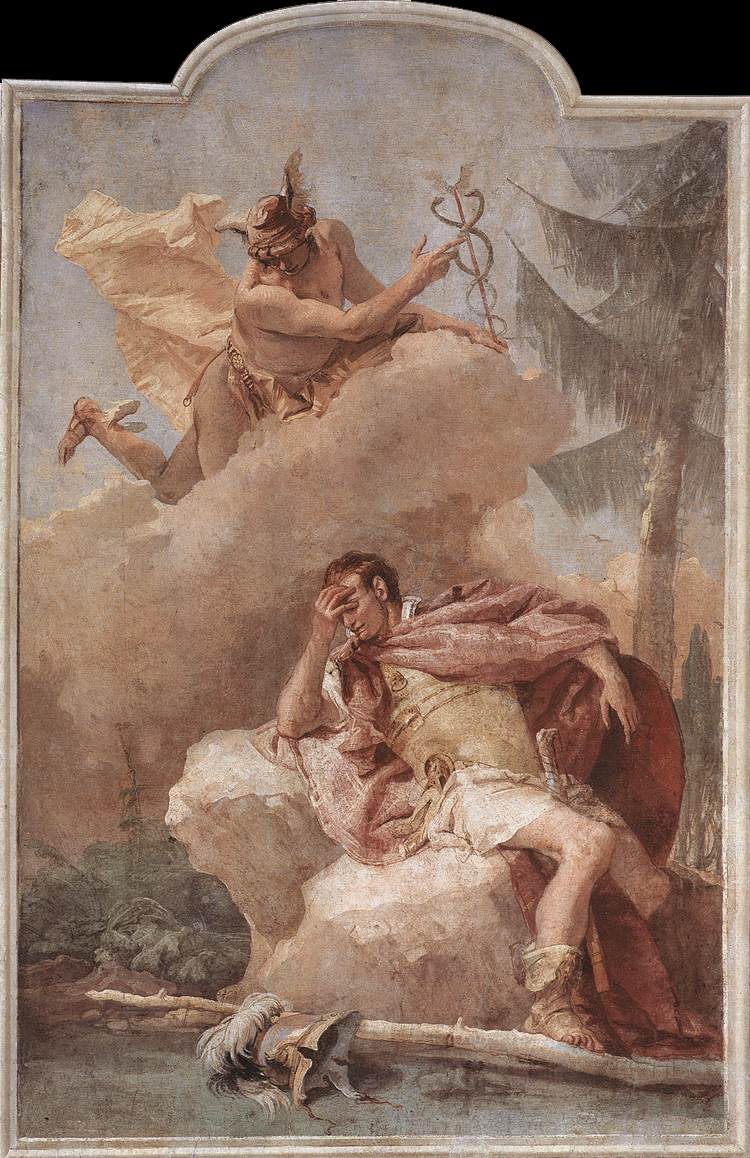The Aeneid, Book IV
Overview Book I Book II Book III Book IV Book V Book VI Book VII
Book VIII Book IX Book X Book XI Book XII
The Fate of Dido
As she listened to his story Dido had fallen in love with Aeneas. She confided in her sister, Anna, about her feelings even though she had promised herself she would never love again after the death of her husband, Sychaeus. Anna urged Dido not to live alone if she had fallen in love again: the city was surrounded by hostile tribes but would be powerful with the help of Aeneas and the Trojans whom she believed had been sent by Juno and the other gods. Anna helped Dido overcome her misgivings.

Her love was described as an all consuming flame and a wound eating away at her; she is compared to a wounded doe who will die as a result of the arrow in its side, just as Dido will die as a result of her love for Aeneas. Dido spent as much time as possible with Aeneas without telling him how she felt, becoming increasingly lovesick and neglecting the building of her city. Juno angrily berated Venus for her and her son, Cupid’s, part in making Dido fall in love. However, she suggested they work together so that Dido and Aeneas married. Venus realised that Juno’s motive was to prevent Aeneas reaching Italy and suggested Juno should ask Jupiter if this was Aeneas’ fate.
Juno said she would but, in the meantime, on the next day, when Aeneas and Dido were planning to go hunting, she would cause a storm. Aeneas and Dido would take refuge in the same cave and become as man and wife. At dawn the next day Dido and Aeneas set out on a hunt with their followers. Dido was dressed in purple and gold and Aeneas was comparable to Apollo in looks and bearing. When the storm struck everyone fled and Dido and Aeneas took refuge in the same cave, as Juno had predicted. The elements, Juno and nymphs were witnesses to the union which Dido chose to call marriage.

Rumours spread about their relationship and came to the ears of king Iarbas, a former rejected suitor of Dido, who had given her the land on which she was building her city. Iarbas was angry and prayed to Jupiter asking him why he allowed Iarbas to be treated so badly. Jupiter immediately sent Mercury to remind Aeneas of his fated destiny in Italy and to instruct Aeneas to leave Carthage. Mercury found Aeneas working on the building of Carthage. He reminded Aeneas of his mission which he owed to his son, Ascanius. Aeneas realised he must obey and leave and, as he tried to work out how he could best tell Dido, he ordered three of his men to prepare the fleet and gather together the Trojans in secret.

But rumour spread to Dido about his plans. Dido, almost out of her mind with anger and compared to a maddened female follower of Bacchus, found Aeneas and berated him for trying to leave in secret, begging him to stay by using every kind of argument she could muster including the wish she had a child by him. Aeneas, determined not to be persuaded to stay, tried to justify his leaving, ending by saying he was following fate, not his own wishes. Dido responded by saying Aeneas was inhuman in his treatment of her and she cursed him in the hope he would be shipwrecked and her ghost would haunt him. She then rushed inside the palace and fainted. Aeneas resisted the urge to go and comfort her and went to his fleet where he found the Trojans working like ants in their preparations to leave.
Dido asked Anna to beg Aeneas to delay his leaving but Aeneas was unmoved by her pleas. Dido then decided to kill herself and began to make the necessary preparations. She persuaded Anna to build a pyre, pretending she wanted to burn all of Aeneas’ belongings to free her mind of him. Not suspecting Dido’s true intentions, Anna did as Dido asked. That night Dido laid on a bed an image of Aeneas, his sword and whatever else he had left behind and she prayed to the gods of the Underworld, calling them as witnesses of her fate. Unable to sleep she went through in her mind the alternatives open to her but came to the conclusion that her only course was action was to die.

Mercury, meanwhile, appeared again to Aeneas in his sleep, warning him of the danger Dido presented if he delayed. Mercury told Aeneas to leave immediately, which he did. At dawn Dido saw that Aeneas and the Trojans had left. She uttered a final curse that Aeneas would suffer war, be driven from his own land, be separated from his son, have to beg for help, see his people dying, not enjoy his new kingdom but die before his time and lie unburied on the shore. Also, that there would be eternal hatred and war between the Carthaginians and future Romans.
Dido then sent for Anna with instructions she was to come prepared to make a sacrifice. She then climbed the funeral pyre and, after speaking her own epitaph, asked that Aeneas see the fire from her pyre as he sailed away. She then killed herself with Aeneas’ sword. Grief at her death spread throughout the city. Anna climbed to the top of the pyre and held Dido, reproaching her for destroying Carthage with her death and blamed herself for building the pyre and not seeing through Dido’s deception. Juno sent Iris to free Dido from her difficult and painful death and to take a lock of her hair to allow her to enter the Underworld.

